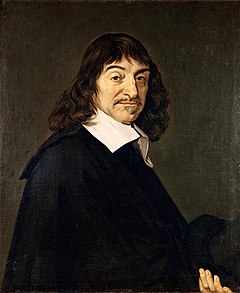Descartes
| René Descartes | |
|---|---|

Portrait after Frans Hals, 1648
|
|
| Born |
31 March 1596 La Haye en Touraine, Kingdom of France |
| Died | 11 February 1650 (aged 53) , Sweden |
| Nationality | French |
| Education |
Collège Royal Henry-Le-Grand (1607–1614) |
| Alma mater |
University of Poitiers University of Franeker Leiden University |
| Era | 17th-century philosophy |
| Region | Western Philosophy |
| School |
Rationalism Founder of Cartesianism |
|
Main interests
|
Metaphysics, epistemology, mathematics, physics, cosmology |
|
Notable ideas
|
Cogito ergo sum, method of doubt, method of normals, Cartesian coordinate system, Cartesian dualism, foundationalism, ontological argument for the existence of God, mathesis universalis, folium of Descartes, Dream argument, Evil demon |
|
Influences
|
|
|
Influenced
|
|
| Signature | |
René Descartes (/ˈdeɪˌkɑːrt/;French: [ʁəne dekaʁt]; Latinized: Renatus Cartesius; adjectival form: "Cartesian"; 31 March 1596 – 11 February 1650) was a French philosopher, mathematician, and scientist. Dubbed the father of modern western philosophy, much of subsequent Western philosophy is a response to his writings, which are studied closely to this day. He spent about 20 years of his life in the Dutch Republic.
Descartes's Meditations on First Philosophy continues to be a standard text at most university philosophy departments. Descartes's influence in mathematics is equally apparent; the Cartesian coordinate system—allowing reference to a point in space as a set of numbers, and allowing algebraic equations to be expressed as geometric shapes in a two- or three-dimensional coordinate system (and conversely, shapes to be described as equations)—was named after him. He is credited as the father of analytical geometry, the bridge between algebra and geometry, used in the discovery of infinitesimal calculus and analysis. Descartes was also one of the key figures in the scientific revolution.
...
Wikipedia
